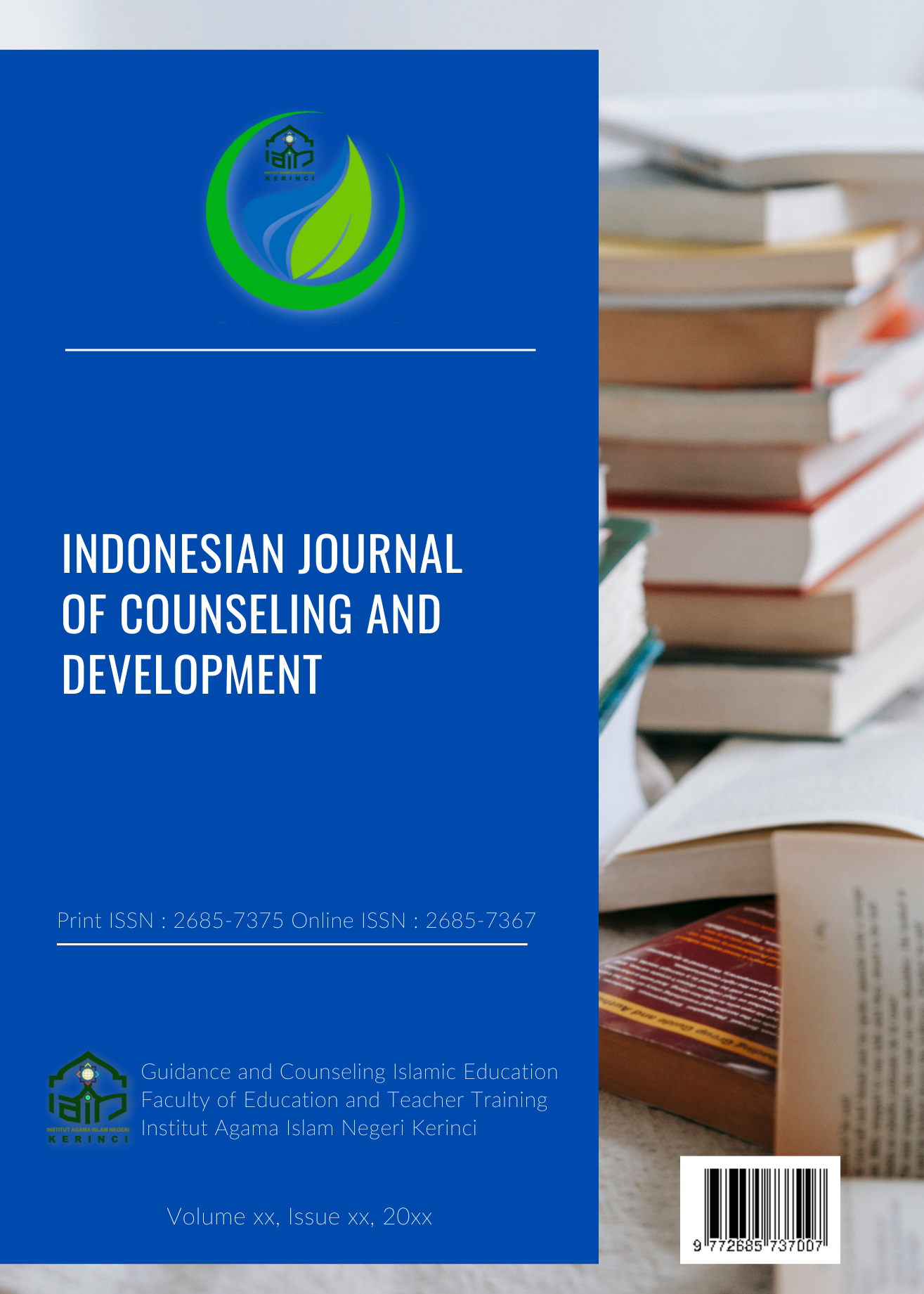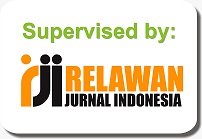The Relationship between Fear of Missing Out (FOMO) and Consumptive Behavior among High School Students in West Palu District
Abstract
The widespread use of digital platforms among secondary school students has led to the emergence of Fear of Missing Out (FOMO), a social anxiety characterised by feelings of exclusion from enjoyable activities experienced by others. Social media features, such as daily stories and live streams on platforms like Instagram and YouTube, encourage students to follow trends. High levels of FOMO are associated with consumerist behaviour, where students purchase items they do not truly need simply to align with lifestyle trends or popular phenomena. This study aims to determine the correlation between FOMO and consumptive behavior among high school students in West Palu District. A total of 300 students were selected using purposive sampling, and the data were analyzed descriptively and inferentially through classical assumption tests (normality and linearity) and product moment correlation. The results showed that 68.66% of students experienced high FOMO, and 52.33% exhibited high consumptive behavior. Pearson's correlation analysis yielded r = 0.767 with p < 0.05, which is greater than the table r of 0.113, thus rejecting the null hypothesis and accepting the alternative hypothesis. These findings serve as a reference for counselors through classical guidance to explain the influence of social media algorithms and influencers, as well as through group counseling services for students with excessive impulsive tendencies. These services can help students shift from FOMO (Fear of Missing Out) to JOMO (Joy of Missing Out) in order to be wiser in their use of social media and consumption patterns.
Downloads
References
Akbar, R. S., Aulya, A., Psari, A. A., & Sofia, L. (2019). Ketakutan akan kehilangan momen (FoMo) pada remaja Kota Samarinda. Psikostudia: Jurnal Psikologi, 7(2), 38–45. https://doi.org/10.30872/psikostudia.v7i2.2404
Amelisastri, W., Yandri, H., & Kholidin, F. I. (2024). Fear of Missing Out (FOMO): Exploring its relationship with self-control and self-regulation in college students. Buletin Konseling Inovatif, 4(2), 122-132.https://doi.org/10.17977/um059v4i22024p122-132
Apolo, M., & Kurniawati, M. (2023). Pengaruh fear of missing out (FoMo) terhadap perilaku konsumtif penggemar K-Pop remaja akhir pada produk merchandise K-Pop. Innovative: Journal of Social Science Research, 3(6), 3847–3858. https://j-innovative.org/index.php/Innovative/article/view/6424
Bloemen, N., & De Coninck, D. (2020). Social media and fear of missing out in adolescents: the role of family characteristics. Social Media and Society, 6(4). https://doi.org/10.1177/2056305120965517
Eka, E. P. W., Wantu, T., & Botutihe, S. N. (2022). Deskripsi perilaku konsumtif siswa kelas IX SMP Negeri 3 Gorontalo. Student Journal of Guidance and Counseling, 2(1), 30–38. https://doi.org/10.37411/sjgc.v2i1.1342
Fitrianingsih, A., Bachri, S., Muzakir, & Farid. (2025). Pengaruh content marketing dan electronic word of mouth (E-WoM) terhadap purchase decision produk Skin1004 yang dimediasi oleh fear of missing out (FoMo) (studi kasus pada Gen Z di Kota Palu). Entrepreneurship Bisnis Manajemen Akuntansi (E-BISMA), 6(1), 167–187. https://doi.org/10.37631/ebisma.v6i1.1830
Hermila, A., Ashari, S. A., Bau, R. T. R., & Suhada, S. (2023). Eksplorasi intensitas penggunaan sosial media (studi deskriptif pada mahasiswa teknik informatika UNG). Inverted: Journal of Information Technology Education, 3(2). https://doi.org/10.37905/inverted.v3i2.2
Juliawati, D., Yandri, H., Kholidin, F. I., Rasmita, R., Daflaini, D., & Fidya, Y. (2025). Integrating Islamic-Based Behavioral Activation with Buya Hamka's Tazkiyatun Nafs to Reduce Social Media-Induced Anxiety among University Students. Buletin Konseling Inovatif, 5(2), 199-209. https://doi.org/10.17977/um059v5i22025p199-209
Kartika, D., Fardhani, M. H., & Anggraeni, R. D. (2025). Hubungan FoMo Boneka Labubu terhadap Impulsif Buying Generasi Z di Kota Surabaya. AKADEMIK: Jurnal Mahasiswa Humanis, 5(1), 588-594. https://doi.org/10.37481/jmh.v5i1.1303
Liu, X., Liu, T., Zhou, Z., & Wan, F. (2023). The effect of fear of missing out on mental health: differences in different solitude behaviors. BMC Psychology, 11(1), 1–8. https://doi.org/10.1186/s40359-023-01184-5
Manopo, A. N., Mandang, J. H., & Kaunang, S. E. (2024). Pengaruh fear of missing out terhadap perilaku konsumersime pada mahasiswa fipp unima. Psikopedia, 5(3), 159-168. https://doi.org/10.53682/pj.v5i3.9517
Mardatilla, M., Hasan, H., Syahran, R., Zuniati, M., & Latief, A. A. (2025). Effectiveness of group counseling solution-focused brief therapy (SFBT) to reduce abuse of smartphones by students. Grief and Trauma, 3(1), 8-16. https://doi.org/10.59388/gt.v3i1.690
Nadzirah, S., Fitriani, W., & Yeni, P. (2022). Dampak sindrom FoMo terhadap interaksi sosial pada remaja. Intelegensia: Jurnal Pendidikan Islam, 10(1), 54–69. https://doi.org/10.34001/intelegensia.v10i1.3350
Nguyen, N. D., & Duy, N. V. (2025). FoMo and the impulsive purchasing behavior of young people. European Journal of Business and Management Research,10(3), 41–47. https://doi.org/10.24018/ejbmr.2025.10.3.2638
Putri, N. L. T., Mas Bakar, R., & Hamid, A. N. (2023). Pengaruh kontrol diri terhadap perilaku konsumtif pada penggemar K-Pop. Peshum: Jurnal Pendidikan, Sosial dan Humaniora, 2(5), 868–874. https://doi.org/10.56799/peshum.v2i5.2204
Przybylski, A. K., Murayama, K., Dehaan, C. R., & Gladwell, V. (2013). Motivational, emotional, and behavioral correlates of fear of missing out. Computers in Human Behavior, 29(4), 1841–1848. https://doi.org/10.1016/j.chb.2013.02.014
Putri, N. M., Ferlianti, R. A., & Zuhri, S. (2024). Analisis perilaku konsumtif pada tren pembelian boneka labubu di kalangan Gen-Z. Komunika: Jurnal Ilmiah Komunikasi, 2(2), 18-24. https://doi.org/10.70437/komunika.v2i2.847
Rasido, I., Hasan, H., & Riyadi, N. E. W. (2025). Mental health literacy study of Tadulako University students. Bulletin of Counseling and Psychotherapy, 7(1), 1–9. https://doi.org/10.51214/002025071157000
Rizky, M., Launa, N., & Farid, E. S. (2025). The influence of impulsive buying and fear of missing out on financial behaviour: the role of financial literacy as a moderator. DIJEFA: Dinasti International Journal of Economics, Finance & Accounting, 6(4), 3063–3071. https://doi.org/10.38035/dijefa.v6i4.4981
Rizqah, R., Sofyan, S., Noval, N., Bachmid, S., & Hamka, H. (2025). The role of bandwagon effect and FoMo in viral marketing. Journal Of Innovation In Business And Economics, 9(02 A), 219–234. https://doi.org/10.22219/jibe.v9i01.40376
Sachiyati, M., Yanuar, D., & Nisa, U. (2023). Fenomena kecanduan media sosial (FoMo) pada remaja Kota Banda Aceh. Jurnal Ilmiah Mahasiswa FISIP USK, 8(November), 1–18. http://jim.usk.ac.id/FISIP/article/view/28040
Subagyo, S. E. F., & Dwiridotjahjono, J. (2021). Pengaruh iklan, konformitas dan gaya hidup hedonis terhadap perilaku konsumtif pengguna e-commerce shopee di Kota Mojokerto. E-Bisnis: Jurnal Ilmiah Ekonomi Dan Bisnis, 14(1), 26-39. https://doi.org/10.51903/e-bisnis.v14i1.342
Suhartini, S., & Maharani, D. (2023). Peran fear of missing out (FoMo) dalam perilaku konsumen terhadap keputusan pembelian. Economics and Digital Business Review, 4(2), 349–356. https://doi.org/10.37531/ecotal.v4i2.613
Sumbodo, Y. P., Marzuki, S., Yudhantara, M., & Widiastuti, D. (2024). Metode Penelitian: Panduan Lengkap untuk Penelitian Kuantatif, Kualitatif dan Campuran. PT Media Penerbit Indonesia). http://repository.mediapenerbitindonesia.com/id/eprint/433
Syandana, D. A., & Dhania, D. R. (2024). Hubungan antara fear of missing Out (FoMo) dan gaya hidup hedonis dengan impulsive buying pada mahasiswa pengguna e-commerce. Jurnal Ilmiah Manajemen, Ekonomi, & Akuntansi (MEA), 8(3), 691-705. https://doi.org/10.31955/mea.v8i3.4502
Syahran, R., Munifah, M., Silalahi, M. F., Hasan, H., & Usman, N. K. (2025). Teknik dispute kognitif terhadap kecanduan game online siswa. Jurnal Konseling Indonesia. 10(2), 79–85. https://doi.org/10.21067/jki.v10i2.11912
Taswiyah, T. (2022). Mengantisipasi gejala fear of missing out (FoMo) terhadap dampak sosial global 4.0 dan 5.0 melalui subjective weel-being dan joy of missing out (JoMo). Jurnal Pendidikan Karakter JAWARA (Jujur, Adil, Wibawa, Amanah, Religius, Akuntabel), 8(1), 103–119. http://jurnal.untirta.ac.id/index.php/JAWARA/article/view/15434
Wardini, A., & Dasalinda, D. (2024). Hubungan intensitas penggunaan media sosial tiktok dengan perilaku konsumtif pada siswa kelas x sman 76 jakarta. JIIP-Jurnal Ilmiah Ilmu Pendidikan, 7(7), 7647-7651. https://doi.org/10.54371/jiip.v7i7.4846
Wahyuningtyas, I., & Hambali, I. M. (2025). Profil kecenderungan fear of missing out (FoMo) pada siswa sekolah menengah atas. G-Couns: Jurnal Bimbingan dan Konseling, 9(2), 984–991. https://doi.org/10.31316/g-couns.v9i2.6764
Wirasukessa, K., & Sanica, I. G. (2023). Fear of missing out dan hedonisme pada perilaku konsumtif millennials: Peran mediasi subjective norm dan attitude. Jurnal Ilmiah Manajemen, Ekonomi, & Akuntansi (MEA), 7(1), 156–175. https://doi.org/10.31955/mea.v7i1.2887
Yandri, H., Juliawati, D., Valdez, A. V., Yuzarion, Y., Rasmita, R., Daflaini, D., & Fidya, Y. (2025). An Islamic Spiritual Response to the Psychological Effects of Loneliness, Academic Stress, and Bullying on Students in Islamic Boarding Schools (Pesantren). Psikis: Jurnal Psikologi Islami, 11(1), 137-149.https://doi.org/10.19109/psikis.v11i1.27855
Yandri, H., Juliawati, D., Rasmita, R., Daflaini, D., & Fidya, Y. (2025). Cyber Wellness dan Anti-Bullying: Program Pemberdayaan Remaja Desa Pasar Sungai Tanduk Kabupaten Kerinci. RANGGUK: Jurnal Pengabdian Kepada Masyarakat, 5(2), 105-111.
Yosep, I., Mardhiyah, A., Fitria, N., Lukman, M., & Hikmat, R. (2024). Fear of missing out among high school students in Bandung. Indonesian Journal of Global Health Research, 6(S5), 459-466. https://doi.org/10.37287/ijghr.v6iS5.4651
Copyright (c) 2025 Ade Avriliani MY. Mastura, Dian Fitriani, Hasan Hasan, Nurwahyuni Nurwahyuni

This work is licensed under a Creative Commons Attribution 4.0 International License.








